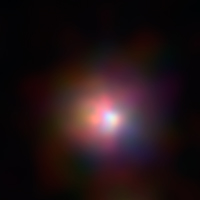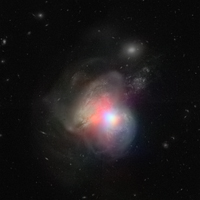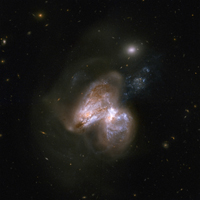Tale of Two Black Holes
 |  |  |
| Figure 1 High resolution TIFF file | Figure 2 High resolution TIFF file | Figure 3 High resolution TIFF file |
Before NuSTAR, astronomers knew that the each of the two galaxies in Arp 299 held a supermassive black hole at its heart, but they weren't sure if one or both were actively chomping on gas in a process called accretion. The new high-energy X-ray data reveal that the supermassive black hole in the galaxy on the right is indeed the hungry one, releasing energetic X-rays as it consumes gas.
In this image, X-rays with energies of 4 to 6 kiloelectron volts are red, energies of 6 to 12 kiloelectron volts are green, and 12 to 25 kiloelectron volts are blue.
NuSTAR is a Small Explorer mission led by the California Institute of Technology in Pasadena and managed by NASA's Jet Propulsion Laboratory, also in Pasadena, for NASA's Science Mission Directorate in Washington. The spacecraft was built by Orbital Sciences Corporation, Dulles, Virginia. Its instrument was built by a consortium including Caltech; JPL; the University of California, Berkeley; Columbia University, New York; NASA's Goddard Space Flight Center, Greenbelt, Maryland; the Danish Technical University in Denmark; Lawrence Livermore National Laboratory, Livermore, California; ATK Aerospace Systems, Goleta, California, and with support from the Italian Space Agency (ASI) Science Data Center.
NuSTAR's mission operations center is at UC Berkeley, with the ASI providing its equatorial ground station located at Malindi, Kenya. The mission's outreach program is based at Sonoma State University, Rohnert Park, California. NASA's Explorer Program is managed by Goddard. JPL is managed by Caltech for NASA.
For more information, visit http://www.nasa.gov/nustar and http://www.nustar.caltech.edu/.
